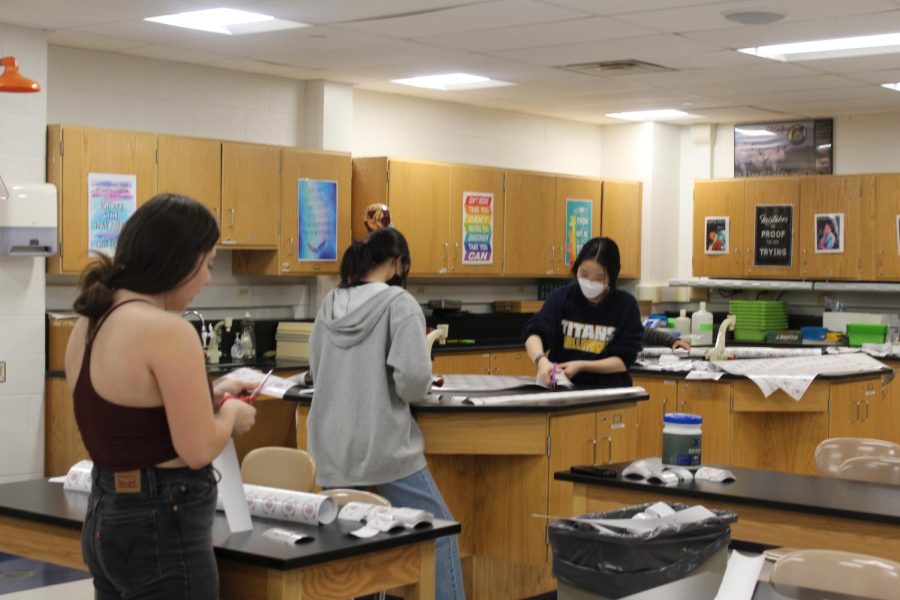Students show support for others through mental health kits
April 22, 2022
Self Appreciation for Everybody (SAFE) Club and Elpida are continuing their successful collaboration from last year to distribute mental health kits to students, David Hartman, Social Worker, and Elpida sponsor, said. The kits are a huge undertaking, with collaboration between the Student Assistance Program, Glenview Northbrook Coalition for Youth, and the Glenbrook Crisis Network, Hartman said.
The mental health kits are packed with candy, fidget toys, stress balls, and contact information for mental health help in and out of school. The mental health kits display a positive mindset for the students by encouraging them to reach out for help, especially during overwhelming times, Despina Mandarino, SAFE Club sponsor, said.
“Inside each kit there’s little positive messages,” Mandarino said. “There’s stickers [students] can put on their laptops or water bottles so they’re constantly being reminded that there are things to be excited and happy about in life.”
The kits are a step toward mental health awareness through addressing people’s struggles and providing resources to help them, junior Ariana Raghian, Vice President of SAFE Club, said.
This is accomplished by encouraging students struggling with mental health to reach out for help and talk with trusted adults, Raghian said.
After the idea was first proposed by South’s administration last year, Elpida and SAFE Club came together to distribute mental health kits to South students, Hartman said.
“[South’s administration] and [Former Principal Dr. Lauren Fagel] had discretionary [funds] that they wanted to spend on [improving students’] mental health,” Hartman said. “While there were many ideas, the one that stuck the most was the idea of wellness kits for every student.”
Beyond including items such as stress balls and candy, the mental health kits also supply resources for students to reach out to, Raghian said.
“We also provided a lot of resources hidden within the things,” Raghian said. “On the pen, there was a phone number [students can call] if [they] ever needed help.”
Lucas Osterbur, Elpida Sponsor and Science Teacher, emphasized the importance of reaching out and getting help for students struggling with their mental health. When students feel isolated and alone, the kits try to send a message that people at South care by sharing resources and highlighting activities to participate in, Osterbur explained.
Mental health problems should not be ignored or suppressed, and the Glenbrook community as a whole should work to provide students struggling with the help they need, Osterbur explained, that awareness helps with treatment.
“The more [that] people [are] aware it’s okay to get the treatment you need for depression or anxiety, the better we will all be as a community,” Hartman said.
The mental health kits can be a positive boost to someone’s day and were very popular among South’s student population, junior Natalie Brady said.
“I think they are helpful for students struggling with mental health because they have little things you can use [like stress balls] but they [also] have a notecard usually so if you [need] more help they have the counselor and hotline numbers [for you],” Brady said.
The contents of the mental health kits provide resources that are both helpful and also fun. The kits also serve as a visual representation of South’s care and concern for other students, Osterbur said.
“When you see something put in the hands of every student in the school, it [demonstrates each students’] thoughts and feelings matter,” Osterbur said.
Organizations such as the Glenview Northbrook Coalition for Youth and the Student Assistance Program have donated much of the money and items necessary for the project, such as the stress balls, Hartman said. With the amount of preparation, collaboration, and work required, it is a big commitment for students and sponsors in both clubs, he explained.
The chief goal of the kits is to encourage students struggling with their mental health to reach out, and let them know they are not alone, Raghain said.
“People usually just need a sign or push to reach out for help and I think us giving them the starting resources definitely helps the students who [are] scared to reach out,” Raghain said.



